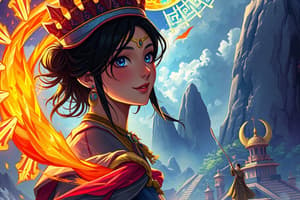Podcast
Questions and Answers
What values are deeply embedded in Filipino culture, inspiring a sense of national pride?
What values are deeply embedded in Filipino culture, inspiring a sense of national pride?
- Hard work, resilience, and unity (correct)
- Sloth, weakness, and segregation
- Disloyalty, incompetence, and individualism
- Laziness, fragility, and division
During the Spanish colonization period, what were the major impacts on the Filipino identity?
During the Spanish colonization period, what were the major impacts on the Filipino identity?
- Complete eradication of all indigenous culture
- Promotion of multicultural diversity
- Forced religious conversion and assimilation (correct)
- Strengthening of pre-existing identities
Which event marked a turning point in Filipino history and paved the way for the modern Filipino identity?
Which event marked a turning point in Filipino history and paved the way for the modern Filipino identity?
- The establishment of kingdoms like Maynila and Tondo
- The arrival of the United States in the 1890s
- The Galleon Trade
- The Philippine Revolution of 1896 (correct)
Which national heroes were key figures in the Philippine Revolution of 1896?
Which national heroes were key figures in the Philippine Revolution of 1896?
What influences characterize the modern Filipino identity?
What influences characterize the modern Filipino identity?
What is the most widely spoken language in the Philippines?
What is the most widely spoken language in the Philippines?
Which festival in the Philippines is known for its UNESCO recognition?
Which festival in the Philippines is known for its UNESCO recognition?
Which cuisine reflects a strong influence from Spanish, Chinese, and Malay cultures in the Philippines?
Which cuisine reflects a strong influence from Spanish, Chinese, and Malay cultures in the Philippines?
Which music and dance form is famous for its unique rhythms and mesmerizing movements in the Philippines?
Which music and dance form is famous for its unique rhythms and mesmerizing movements in the Philippines?
How does Filipino pride contribute to empowering individuals according to the text?
How does Filipino pride contribute to empowering individuals according to the text?
Flashcards are hidden until you start studying
Study Notes
Celebrating Filipino Identity: Pride in Our Heritage
Hailing from the archipelago of more than 7,000 islands, the Filipino people have a rich and diverse history that they wear as a badge of pride. The values of hard work, resilience, and unity are deeply embedded in our culture, and they inspire the sense of national pride that unites us as a Filipino community, both at home and abroad.
A Brief History of Filipino Pride
The journey towards Filipino pride is deeply intertwined with our country's history. From precolonial times, Filipinos developed a strong sense of national identity through the establishment of kingdoms like Maynila and Tondo, and the formation of trading networks like the Galleon Trade.
Spanish colonization brought a period of religious conversion and cultural assimilation, which shaped the Filipino identity over centuries. The arrival of the United States in the 1890s marked a time of political and economic change, leading to the rise of Filipino nationalism and the eventual declaration of Philippine independence in 1946.
The Philippine Revolution of 1896, led by national heroes José Rizal, Andrés Bonifacio, and Emilio Aguinaldo, signified a turning point in Filipino history. Their struggle for freedom and sovereignty paved the way for the modern Filipino identity, which today is characterized by a blend of Spanish, Chinese, Malay, and indigenous influences, as well as our own distinct customs and traditions.
Cultural Elements of Filipino Pride
Filipino pride is deeply rooted in our rich cultural heritage, including:
- Our Language: Pilipino, or Tagalog, is the most widely spoken language in the Philippines. Aside from this, the country is home to over 180 different ethnic languages, reflecting a rich tapestry of cultural influences.
- Our Festivals: The Philippines is known for its vibrant and colorful festivals, many of which are UNESCO-recognized. From the Ati-atihan Festival in Aklan to the Sinulog Festival in Cebu, these events celebrate Filipino traditions and provide opportunities for people to bond and strengthen their sense of community.
- Our Cuisine: Filipino cuisine is a unique blend of flavors, with dishes like Adobo, Sisig, and Lumpia reflecting the country's diverse culinary heritage. Our cuisine has a strong influence from Spanish, Chinese, and Malay cultures, and it continues to evolve and adapt over time, providing a delicious representation of the Filipino identity.
- Our Music and Dance: Filipino music and dance forms, such as Kundiman, Tinikling, and Tango, are beloved around the world for their unique rhythms and mesmerizing movements. These art forms celebrate the richness of Filipino culture and serve as a testament to our people's creativity and skill.
The Importance of Filipino Pride in Modern Times
Filipino pride continues to play a vital role in shaping our country's future. By celebrating and embracing our rich cultural heritage, Filipinos can:
- Promote a Strong National Identity: A strong sense of Filipino pride helps to strengthen our nation's unity, fostering a shared set of values and beliefs that brings people together.
- Empower Filipinos to Achieve Their Dreams: Filipino pride provides a sense of self-confidence and self-worth, empowering Filipinos to achieve their dreams and reach their full potential.
- Encourage Filipino Creativity and Innovation: By celebrating our rich cultural heritage, Filipinos are inspired to explore their creativity and develop innovative solutions to the challenges we face.
- Foster a Stronger Sense of Belonging: Filipino pride helps to create a strong sense of belonging among Filipinos, both in the Philippines and around the world.
In conclusion, being proud to be a Filipino is a vital part of our national identity, and it serves as a testament to our people's resilience, hard work, and unity. By celebrating and embracing our rich cultural heritage, we can inspire future generations to achieve their dreams and help to shape a stronger, more prosperous future for the Philippines.
Studying That Suits You
Use AI to generate personalized quizzes and flashcards to suit your learning preferences.




